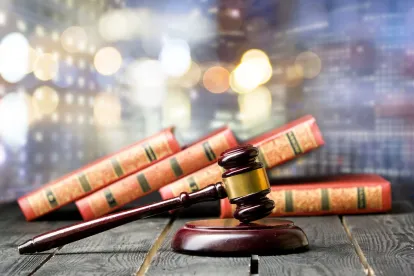On 23 December 2021, the Patent Trial and Appeal Board (“the Board”) instituted inter partes review (IPR) of U.S. Patent No. 7,725,759 B2 (“the ’759 patent”). See OpenSky Indus., LLC v. VLSI Tech. LLC IPR2021-01064, Paper 17 (Dec. 23, 2021). Petitioner OpenSky Industries, LLC (“OpenSky”) relied on expert declarations of Dr. Sylvia D. Hall-Ellis and Dr. Bruce Jacob originally filed by Intel Corporation in two other IPR proceedings (“Intel IPRs”).1 Indeed, the declaration included the same coversheet that accompanied the declaration in the Intel IPR. The Board analyzed OpenSky’s Petition under §314(d) and §325(d), declining to deny institution, finding, in part, that since Fintiv and General Plastic did not warrant discretionary denial, the arguments, which were almost identical to those made in the Intel IPRs, deserved to see their day in court at the PTAB.
-
The Board declined to discretionarily deny OpenSky’s IPR petition under 35 U.S.C. §314(d)
First, VLSI asked the Board to deny OpenSky’s IPR petition because it claimed OpenSky’s declarations from the Intel IPRs were unreliable hearsay. The Board explained that nothing in the record indicated the expert would be unwilling to testify or was constrained from participating, and therefore it was likely that OpenSky could meet its burden of producing the expert for cross-examination as a witness.
VLSI argued that the Petitioner would be unable to produce Dr. Hall-Ellis due to an exclusivity agreement with Patent Quality Assurance, citing the petition in Patent Quality Assurance, LLC v. VLSI Tech. LLC, IPR 2021-01229. However, after filing its petition Patent Quality Assurance clarified that the exclusivity agreement did not exist, suggesting there was no evidence that Dr. Hall-Ellis would be unable to testify.
Next, VLSI asked the Board to discretionarily deny OpenSky’s IPR petition under Apple v. Fintiv, Inc., IPR 2020-00019, Paper 11 (Mar. 20, 2020) (precedential). VLSI claimed that under the Fintiv Factors, the Board should deny OpenSky’s IPR petition because of prior litigation in which a jury determined that the ‘759 patent was not invalid over certain product-type prior art. The Board, applying the Fintiv Factors, declined to discretionarily deny the petition. It explained that there was no possibility for the district court to issue a stay because the Intel litigation was over and similarly that the Intel litigation had a known outcome and investment.
Additionally, the invalidity basis presented to the jury in the Intel litigation did not overlap with the grounds in OpenSky’s IPR petition, and OpenSky was not a party to the Intel litigation. Further, the Board explained that there would not be any inconsistent result between the IPR proceeding and the completed district court proceeding because the Intel litigation did not resolve the issue presented by OpenSky’s IPR petition.
As a final point regarding Fintiv, the Board emphasized that prevailing in litigation against one party does not protect patent owners from challenges raised by different parties on grounds distinct from those raised in the prior litigation.
-
The Board declined to deny under 35 U.S.C. §325(d)
VLSI then claimed that the Board should discretionarily deny OpenSky’s petition because the petition presented the same challenges as the prior, already denied Intel IPRs. In making its argument, VLSI relied on the factors in General Plastic Indus. Co., Ltd. v. Canon Kabushiki Kaisha, IPR2016-01357, Paper 19 (Sept. 6, 2017) (precedential). The Board began by explaining that it did not deny either of the Intel IPRs on the merits of the challenges, but rather because of parallel district court litigation. The Board then applied the General Plastic Factors to OpenSky’s IPR petition.
The Board explained that Factor 1 weighed somewhat against discretionary denial because OpenSky had not filed a prior petition, and while it did copy substantive grounds from the prior Intel petitions, the Board did not substantively address the merits of the prior Intel petition.
The Board concluded that neither of Factors 2 or 4 supported discretionary denial because OpenSky did not have knowledge of the Intel IPRs or Intel litigation until after the related verdict, and OpenSky, as an entity, did not form until after the Intel litigation verdict. The Board noted that it could not conclude that OpenSky should have known about the art it asserts without some factual support from VLSI.
On the other hand, the Board found that Factor 3 weighed in favor of discretionary denial because, while VLSI failed to identify how OpenSky could use the Board’s denial of the Intel IPRs based on Fintiv for road mapping, OpenSky did have the opportunity for road mapping after reviewing VLSI’s Patent Owner’s preliminary responses in the Intel IPRs.
Regarding Factor 5, the Board found that it weighed against discretionary denial because OpenSky provided a reasonable explanation for the timing of its petition, noting that it was reasonable for them to take interest in the ‘759 patent after the conclusion of the trial and choose to challenge it after a substantial damage award. It is also notable that OpenSky was formed after the Intel litigation verdict.
Finally, the Board concluded that Factors 6 and 7 weighed against discretionary denial because the Board had not expended resources on substantive consideration for the challenges on the ‘759 patent. As such, after considering all the General Plastic factors, and noting that only one of them weighed against institution, the Board chose not to use its discretion to deny OpenSky’s IPR petition.
The Board also declined to deny OpenSky’s petition under 35 U.S.C. §325(d). More specifically, the Board rejected VLSI’s argument that because they had previously denied the Intel IPRs for abusive filing practices it would be inconsistent for them to allow the almost identical arguments presented in the OpenSky petition. The Board explained that it denied the Intel IPRs to avoid overlap with parallel district-court litigation (Fintiv), rather than for abusive filing practices. The Board rather explained that the OpenSky IPR involves a different petitioner than the Intel IPRs, meaning it is not a potentially abusive filing by the same challenger.
The present VLSI decision provides insight as to how petitioners can avoid discretionary denials by the PTAB. For example, to avoid successful hearsay challenges when using expert declarations from different proceedings, petitioners should ensure that the experts are not unable, unwilling, or otherwise constrained from acting as witnesses that can be cross-examined. Good practices would include engaging the expert to execute a new declaration, or at a minimum ensuring the correct proceeding is reflected in the declaration.
The present VLSI decision also provides good direction for petitioners in cases where the Board has previously denied other IPRs for the same patent. More specifically, the Board provides a good explanation of its approach when applying the General Plastic factors. The Board made it clear that it is reasonable for a petitioner to wait to challenge a patent after some legal events, such as substantial damage award. VLSI also clarified that the Board will not conclude that a petitioner should have had knowledge of prior art unless the patent owner can make factual assertions to support that finding. Most importantly, petitioners should pay special attention to whether any prior petitions for the same patent were denied on the same substantive basis. As the Board made it clear, if a prior petition was denied on a non-substantive basis, this will likely not weigh against the petitioner’s request. This is particularly helpful for indemnitors who may seek to file an IPR petition when they themselves are not a party to any underlying district court litigation.
The present decision also provides various lessons for patent owners. As the Board emphasized in its ruling, patent owners seeking discretionary denials based on parallel district court litigation (Fintiv) or prior petitions (General Plastic) should show a connection between the substantive grounds in the litigation or prior petitions, and the current petition before the Board. The present decision also highlighted the importance of delineating the specific changes made by petitioners whenever patent owners make a road mapping argument. Relatedly, the Board made it clear that it will not presume petitioner knowledge of prior art, but will consider it if patent owners provide factual support calling a petitioner’s knowledge denial into question.
Footnote:
-
Intel Corp. v. VLSI Tech. LLC, IPR2020-00498 (PTAB) (on appeal to Federal Circuit, No 21-1617); Intel Corp. v. VLSI Tech. LLC, IPR2020-00106 (PTAB) (on appeal to Federal Circuit, No. 21-1614). Paper 5.






 />i
/>i
